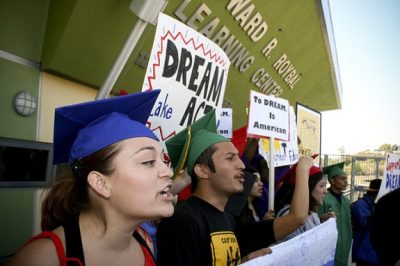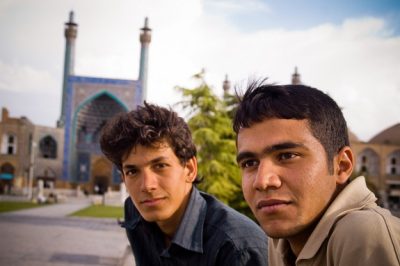Border Enforcement
Migration at the border is a multifaceted issue, challenging the U.S. to secure our borders while upholding the human rights of individuals seeking safety and better opportunities. Balancing national security with compassion and our legal obligations to asylum seekers presents intricate dilemmas, and we collaborate with policymakers to advance bipartisan, action-oriented solutions.
Beyond A Border Solution
- Asylum
- May 3, 2023
America needs durable solutions. These concrete measures can bring orderliness to our border and modernize our overwhelmed asylum system. Read…
Read More
In California, TRUST Act One Step Closer to Becoming Law
The California state Senate overwhelmingly approved the TRUST Act on Thursday, marking a significant step for a piece of legislation aimed at limiting the humanitarian impact of the Secure Communities program. The bill must still pass the state Assembly and be signed by Gov. Jerry Brown to become law, but its success thus far represents an important victory for the immigrants rights movement and has positioned California as the “anti-Arizona” among states frustrated with Washington’s failure to enact comprehensive immigration reform. Read More

Why Human Trafficking Cases are Falling Through the Cracks
Human trafficking is a big yet commonly overlooked problem in the United States and abroad. Each year, roughly 600,000 to 800,000 people are trafficked across international borders, according to the Department of State, with about 17,500 into the United States. Despite an uptick in laws aimed at addressing this problem, U.S. law enforcement and state prosecutors haven’t identified or prosecuted as many cases as expected given the large number of cases, leaving many to question why. In a recent report, however, experts at the Urban Institute and Northeastern University shed some light on why so many cases seem to be falling through the cracks. Read More

According to Scott Beason, Alabamans Will Return to “Menial Jobs” Over Time
Alabama State Senator Scott Beason continues to link the state’s recent dip in unemployment to its extreme immigration law (HB 56), even though there is no evidence to support that this theory. In fact, many Alabama business have reported difficulties in replacing immigrant workers, many of whom have left the state or gone further underground. But in a recent effort to address this reported labor shortage, Sen. Beason—a sponsor of HB 56—managed to insult both immigrants and native Alabamans alike. Read More

Groups Seek Information on CBP’s “Translation” Activities in Northern Border States
Washington, D.C. – Last week an alliance of immigration advocacy groups represented by the Legal Action Center filed Freedom of Information Act (FOIA) requests with U.S. Customs and Border Protection (CBP). The FOIA requests seek information regarding CBP policies on providing translation assistance to other law enforcement agencies and on… Read More

How Should Obama Administration Proceed with Deferred Action Program?
In a June 15th memo announcing deferred action for immigrant youth, DHS Secretary Janet Napolitano gave USCIS 60 days to come up with a process that will allow these young people to affirmatively apply for the chance to work, study, and live in the U.S. without fear of deportation. To be sure, USCIS staff and their counterparts at ICE, CBP, and DHS, have been entrusted with a difficult job—one that requires balancing legal and practical implementation issues against high expectations and years of built up frustration over the lack of immigration reform. But the real challenge is acknowledging that every single decision they make about the program has the chance to make it harder or easier for young people to realize their dreams. Read More

How the President’s Deferred Action Initiative Will Help the U.S. Economy
President Obama’s June 15 “deferred action” announcement is good not only for the 1.4 million unauthorized children and young adults who have been granted a temporary reprieve from deportation, but also good for the U.S. economy. Each year, tens of thousands of unauthorized students graduate from primary or secondary school, often at the top of their classes. They have the drive and intelligence to become doctors, nurses, teachers, and entrepreneurs, but their lack of legal status has prevented them from attending college or working legally. The President’s deferred action initiative has finally provided them with an opportunity to live up to their full potential and, in the process, earn more, spend more, and pay more in taxes. Read More

Clearing the Air on Immigrants, the Military, and Deferred Action
President Obama’s June 15 announcement on deferred action for DREAMers raised a number of questions about what it means and how it will be administered. One of the biggest questions is regarding military service. According to the DHS memo, among those eligible to be granted deferred action are an individual who is an “honorably discharged veteran of the Coast Guard or Armed Forces of the United States.” Then, during his speech to NALEO, GOP presidential candidate Mitt Romney stated that he would support a path to legal residency for “those who have risked their lives in defense of America.” The language of the DHS memo compounded by Romney’s remarks led some to believe that undocumented immigrants could serve in the military and therefore qualify for deferred action or some sort of legalization program. But this is not the case. Read More

DHS’s NSEERS Program, While Inactive, Continues to Discriminate
For a long time after 9/11, immigration reform was only discussed as a national security issue, and many policies were put in place aimed at stopping terrorists from entering the country. Unfortunately, some of these policies—such as the National Security Entry-Exit Registration System (NSEERS) program—targeted particular ethnic groups, promoted profiling, and resulted in discrimination and civil rights violations. In recent years, the Obama administration has made efforts to end the NSEERS program, but NSEERS still exists and the impact of these policies is still being felt in immigrant communities. In fact, the Rights Working Group, a coalition of civil rights organizations, recently released a report, The NSEERS Effect: A Decade of Racial Profiling, Fear, and Secrecy, which analyzes the continuing impact of this post-9/11 policy. Read More

In Arizona Case, Supreme Court Affirms Legality of Prosecutorial Discretion
The Supreme Court dealt a blow to the restrictionist movement on Monday by striking down three provisions of Arizona SB 1070 and leaving a fourth vulnerable to future challenge. But in a lesser noticed development, the Court also undercut the arguments of critics who contend the President violated the Constitution by recently directing his administration not to deport otherwise removable immigrants who were brought to the country as children. As the majority opinion confirmed—and not even Justice Scalia denied—the President’s authority to set enforcement priorities is a valid and important aspect of the immigration system. Read More

DHS Rescinds Part of Controversial 287(g) Program in Arizona
The Obama administration suspended part of its controversial 287(g) program in Arizona this week following the Supreme Court’s ruling in Arizona v. United States. DHS announced that it was ending its “287(g) task force agreements” in Arizona —agreements which deputize certain local police to enforce immigration laws. Other state immigration programs, however, like Secure Communities and the 287(g) jail agreements (which allow deputized arresting officers to enforce immigration laws in jails), will remain in effect. Read More
Make a contribution
Make a direct impact on the lives of immigrants.

